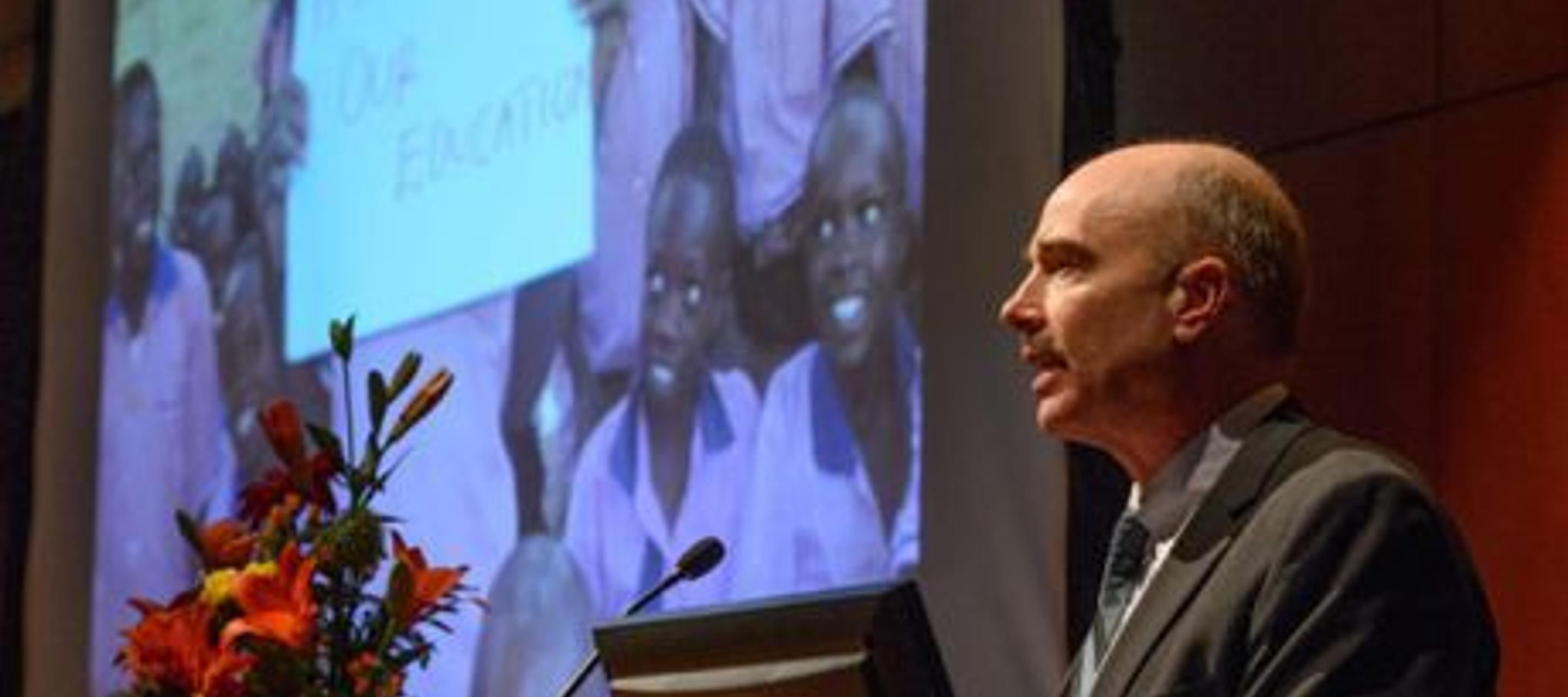A tribute to Chris Avery
16 September 2013

As the opening session of the first annual UN Forum on Business and Human Rights in Geneva last December ended, I paused near the entrance of the main hall, waiting for colleagues. Standing beside me was my friend Chris Avery, the founding director of Business and Human Rights Resource Centre (BHRRC) which, much to his annoyance more than a decade after its creation, many still refer to as “Chris’s website”.
Chris surveyed the massive hall: there was that gentle murmur that follows the end of a session as delegates got up, leaving the room, making new acquaintances, greeting old ones, as they left for smaller sessions, on issues ranging from corporate due diligence to the return of Myanmar as an investment destination, to ongoing abuses of labour rights around the world.
It was the week of the anniversary of the Bhopal Gas Disaster in India in 1984; it was also the week the Tazreen factory caught fire in Dhaka, killing over a hundred workers. Reality – past and present – was intruding on the deliberations in Geneva. The Resource Centre Chris had done so much to make a central point of information globally on all things “business and human rights” – had already posted stories from India and Bangladesh.
Looking at the people – over a thousand – Chris’s eyes glistened and he kept shaking his head: “Could you have imagined this scene a decade ago?”
I knew exactly what he meant: could we have imagined a decade ago that Palais des Nations in Geneva, where the League of Nations once met, and which was the second home of the United Nations, facing the Alps and Lac Leman, would be filled with people from around the world – government representatives as well as corporate and civil society leaders - coming together to discuss the impact of business on human rights, and what more could be done to mainstream human rights considerations and standards in business conduct? Could we have guessed then that business and human rights would finally become a serious matter for politicians and statesmen, and no longer be confined to the feel-good world of corporate social responsibility?
The short answer is no, it was impossible to imagine that. For those who were at the forefront of what can loosely be described as the business and human rights movement, the early days were a hard grind. Companies didn’t see human rights as their responsibility; government didn’t see corporate misconduct as something they should worry about too much; home governments looked the other way when companies headquartered in their jurisdiction behaved badly abroad; host governments pleaded helplessness, saying they simply didn’t have resources and needed the investment anyway; and civil society groups remained divided between those who hadn’t grasped the link between business (a private actor) and human rights (a state obligation) and therefore didn’t pay much attention to business, and those who wanted to regulate strictly, if not outlaw, most business activity, thinking that business can only do harm to human rights.
But there were individuals who knew better. They knew the limits of governmental reach, the passion of civil society, and the willingness of some companies to do good – and they raised their voices – Mary Robinson, former President of Ireland and former UN Human Rights Commissioner (who also helped found the Institute for Human Rights and Business and chaired the international advisory council of BHRRC); the late Geoffrey Chandler, formerly of Shell, who founded Amnesty International’s first business group in the UK; the late Nick Howen of the International Commission of Jurists who pushed for greater corporate accountability, among many others.
Chris Avery has been one of these pioneers of the business and human rights agenda – a champion of human rights, a lawyer who could explain complex, technical points simply, a man of integrity who commanded respect from governments, businesses, and civil society groups, an advocate who earned his credibility by being fair.
Chris understood the international human rights mechanisms at the UN, and saw the gaps in global understanding of roles and responsibilities between states, which prevented collective action in dealing with corporations, which operated in multiple jurisdictions.
The website and organization he brought into being contrasted the global dialogue with the reality on the ground: for the community in the Niger Delta, it doesn’t matter whether the contamination of its river is because of the failure of the Nigerian National Petroleum Corp., a multinational corporation, the state government, or the central government. Its fish stock is declining, its children are getting sick, and when they try to protest, the police are beating up their young men. It wants a solution, not a protocol or declaration or a communiqué, and it wants it now.
Arcane human rights protocols discussed in Geneva have value because they set standards – and Chris and his colleagues knew detailed accounts of deliberations and presentations were important – but civil society argued those conversations wouldn’t provide instant relief – and the BHRRC website gave space to those as well.
Someone needed to research those stories, and bring those voices not only to the public domain, but also to the attention of policymakers in Geneva, New York, London and elsewhere. Human rights groups, committed to changing state conduct, weren’t doing it. Civil society groups, particularly of the south, didn’t have access to the companies. Chris did not have the resources to hire researchers who could produce primary research in each case. But he could assess material that came to him – through his years as a senior legal officer at Amnesty International he understood the value of testimonies and reports from the ground.
Hence, the web-based information gateway was born. It would be a one-stop shop where companies could find out what others were saying about them, NGOs could get their reports disseminated, academics could find a treasure-trove of information, and Chris’s team of researchers would raise questions with companies, always politely, asking for their response to reports published about them. From his years at Amnesty International, Chris knew the power of an individual letter seeking a response.
Over the decade, more companies began paying attention to the website; more companies responded to criticism; and these were not only companies from the industrialised north and the west. The website maintains a repository – of international standards, norms, and laws that apply to the field of business and human rights – so that nobody could say he didn’t know.
In the years Chris has been building the website, the business and human rights agenda has moved significantly. The UN set up the Global Compact, the US and UK governments came together with oil and mining companies and human rights groups to create the Voluntary Principles on Security and Human Rights, and oil and mining companies sat down with governments and civil societies to create the Extractive Industries Transparency Initiative.
Later, Kofi Annan appointed John Ruggie of Harvard as his special representative for business and human rights who would go on to produce the UN Guiding Principles on Business and Human Rights. Ruggie (who now chairs IHRB) needed a place to post the range of materials he had prepared under his UN mandate, and needed a space where others could respond to him. BHRRC became the logical space to provide that support.
Over its first decade of existence, what Chris began has become the go-to place for information on business and human rights. The website’s genius lay in the connections it made possible, bringing the business and human rights communities closer, making activists in far-flung corners feel they weren’t alone.
Today there is a plethora of initiatives, some multi-stakeholder, some industry-specific, and few question the basic idea: that business has the responsibility to respect human rights, and must not cause harm, and if it does, there are consequences – not only to its social license to operate, but also, in some cases, legal liabilities. Chris has been among the leaders who guided the conversation so that it stayed constructive.
That day in Geneva nearly a year ago, none of us knew Chris was planning to retire – he began telling friends later that December. Now we are in September 2013, and Phil Bloomer, formerly at Oxfam, has joined Chris’s able deputy, Mauricio Lazala and the talented team at the Resource Centre, to continue and build on what Chris began. Ever the dedicated leader, Chris is ensuring a smooth transition before he leaves London at the end of this month for his home, the United States.
“Stay with us”, we said at dinner with him recently. If you were to create a global dream team of business and human rights champions, Chris would be very much part of it, the man who enabled everything to connect, providing the platform for the conversations to flow. He will be missed, but we know he will stay with us.



